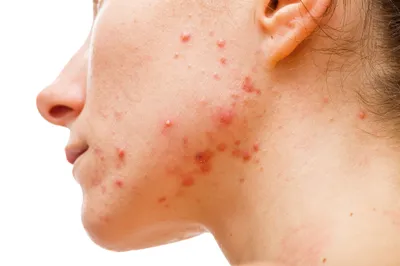Do you get after eating dairy? Do you feel gassy after consuming grains?
Even though you might not experience the hives, swelling, and breathing difficulties associated with a food allergy—you may have food sensitivity if you experience several of the following eight symptoms…
1. Lethargy
Eating is meant to fuel the body and brain—not zap you of energy, which is why lethargy (or fatigue) may point to food sensitivity. Foods that the body can’t convert into energy via digestion often cause a negative immune responses that can leave you feeling drained, particularly if your system has difficulty expelling these foods through bowel movements.
2. Skin Issues
If you have a dairy sensitivity you may notice whiteheads and acne appear after you consume milk products. In fact, there is a huge body of epidemiological research to support a link between acne and rosacea and dairy sensitivity. A 2008 report published by the National Institutes of Health indicated that 10-percent of patients with acne rosacea also suffered from small intestine bacterial overgrowth (SIBO), a condition that causes abnormal bacterial growth in the small intestine. The same study showed that removing dairy from the diet resulted in rosacea clearing up considerably.
3. Painful Bloating
Gas pain, bloating, painfully distended belly, embarrassing flatulence—often indicate food sensitivity. If you eat a lot of processed, deep fried foods, you may develop a food backlash with these uncomfortable and awkward side effects if the good and bad bacteria in your gut become imbalanced.
4. Irritability
If you’ve recently given up a favorite food because you suspect food sensitivity, mood swings can hit you like a brick wall. If you’ve sworn off refined sugar, gluten, or dairy, you might feel like a drug addict going through withdrawal, but your feelings aren’t far from the truth. Medical doctor, James Braly, who holds the position of medical director of York Nutritional Laboratories and who also wrote the book, Food Allergy Relief, says that foods high in gluten, dairy, and refined sugars are natural opiates and “cravings may actually be a telltale sign of a food addiction”.
5. Joint Inflammation
It’s very common to experience joint pain and inflammation as a result of food sensitivity. As the body responds negatively towards a food (i.e., commonly soy, gluten, eggs, or dairy) inflammation occurs and settles in the joints—typically the knees, hips, feet, and ankles—creating a chronic cycle each time you consume the food. The only respite for food-related inflammation is to eliminate the problem food.
6. Overpowering Cravings
Cravings are inevitable when you’re dealing with food sensitivity and still consuming the damaging food. According to Doctor Michael Rosenbaum, a preventive medical specialist from California, food sensitivity often causes a paradox of cravings for the exact food the body is rejecting. This occurs when the harmful food doesn’t break down and undigested food particles permeate your gut creating a negative immune response. The presence of undigested food circulating in your system causes intense cravings.
7. Headache
If you’ve experienced the headaches and chronic migraines associated with food sensitivity, findings from a research study conducted at the Hospital for Sick Children in London shouldn’t surprise you. The study drew a clear link between migraines and food sensitivity when they put a group of 88 children with severe and frequent migraines on an elimination diet. Almost 90-percent of the participants improved greatly or completely when problem foods were eliminated from their diets—while the vast majority suffered returning migraines when the trouble food was reintroduced.
8. Heartburn
The telltale slow burn of stomach acid washing up into your esophagus is a telltale symptom of food sensitivity. This occurs when the body rejects certain foods, stomach acid will be insufficient leaving food particles undigested and lingering in your gut, triggering nasty acid indigestion and heartburn discomfort.











